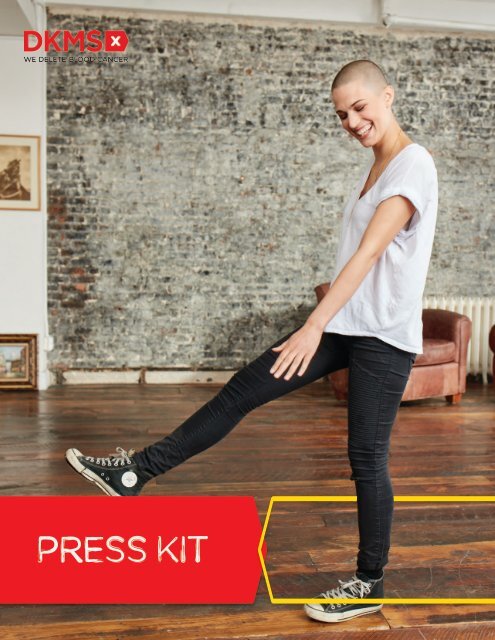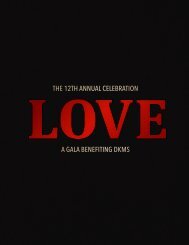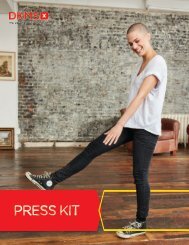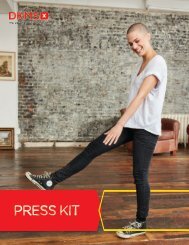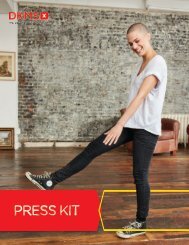Press Kit
You also want an ePaper? Increase the reach of your titles
YUMPU automatically turns print PDFs into web optimized ePapers that Google loves.
<strong>Press</strong> <strong>Kit</strong>
About us<br />
DKMS is an international nonprofit organization dedicated to eradicating blood cancers like leukemia and other blood-related<br />
illnesses inspiring both men and women around the world to register as bone marrow and blood stem cell donors. DKMS is<br />
providing patients with a second chance at life, working closely with families from diagnosis to transplant and beyond. The<br />
donor journey begins with a swab of the cheek that takes less than two minutes and can be the action that leads to a lifesaving<br />
transplant. DKMS, originally founded in Germany in 1991 by Dr. Peter Harf, has organizations in Poland, Spain, the United<br />
Kingdom and the United States. The U.S. office was started in 2004. Globally, DKMS has registered more than 7.4 million<br />
people. To join the fight against blood cancer or for more information, please go to dkms.org.<br />
DKMS is dedicated to the fight against blood cancer and blood<br />
disorders by:<br />
creating awareness<br />
recruiting stem cell donors to provide a second chance<br />
at life<br />
raising funds to cover costs<br />
supporting the improvement of therapies through<br />
research<br />
supporting patients from day one of their diagnoses<br />
Today, DKMS has offices in Germany, the United States<br />
(opened 2004), Poland (2009), Spain (2011) and the UK<br />
(2013) and has registered over 7 million potential donors<br />
worldwide. DKMS has over 600 staff members from 20<br />
countries dedicated to help give every blood cancer patient<br />
a second chance at life.<br />
DKMS is driven by innovation and invests in our people’s<br />
ideas in order to be the premier provider of assistance to<br />
blood cancer patients throughout the world.
What is Blood Cancer?<br />
Blood cancer is malignancy that attacks the blood, bone marrow, or lymphatic system. The three types of blood cancer are<br />
leukemia, lymphoma and multiple myeloma.<br />
When conventional treatments such as chemotherapy don’t work, bone marrow transplant may be a potential treatment.<br />
3<br />
minutes<br />
Every 3 minutes, an<br />
American is diagnosed<br />
with blood cancer.<br />
1<br />
day<br />
Every day,<br />
at least 19 of our donors<br />
give patients a second<br />
chance at life.<br />
9<br />
minutes<br />
Every 9 minutes,<br />
an American is lost<br />
to blood cancer.<br />
how do you Donate Bone Marrow?<br />
Matching is linked to ethnicity because certain HLA markers are more common among specific ethnicities. It is more likely<br />
that patient-donor matches will happen between those who share the same ancestry. Patients from backgrounds that are<br />
underrepresented in the registry are less likely to find a match.<br />
Peripheral Blood Stem Cell<br />
Through peripheral blood stem cell donation cells are collected from blood stream. On the day of<br />
collection the donor’s blood is removed with a sterile needle from one arm and passed through a<br />
machine that separates out the blood stem cells. The remaining blood is returned to the donor<br />
through the other arm. The cell collection is an outpatient procedure that takes about 6-8 hours<br />
over one day. This method is used for 75% of donations.<br />
Bone Marrow Donation<br />
Through bone marrow extraction, cells are collected from the pelvic bone while under anesthesia.<br />
Marrow cells are collected from the backside of the pelvic bone (not the spine) using a special<br />
syringe. Donors receive general anesthesia so no pain is experienced during the extraction. This is a<br />
1-2 hour, out patient surgical procedure. This method is used for the remaining 25% of donations.
why Diversity on the registry<br />
matters<br />
Matching is linked to ethnicity because certain HLA markers are more common among specific ethnicities. It is more likely<br />
that patient-donor matches will happen between those who share the same ancestry. Patients from backgrounds that are<br />
underrepresented in the registry are less likely to find a match.<br />
Sickle cell disease affects millions of people throughout the world. In the United States alone, sickle cell disease occurs<br />
among 1 out of every 500 black or African American births. African Americans have the most diverse tissue types, which<br />
makes the matching process even more challenging. The likelihood of finding a bone marrow match for an African<br />
American adult is 76% compared with populations described as white/Caucasian, which is 97%. The cure for sickle cell<br />
disease and other life-threatening diseases is in the hands of ordinary people.<br />
sex and the registry<br />
Young male donors under the age of 30 have the highest probability of being selected. Males typicaly have more body<br />
mass than women making them better candidates than women. Despite this, men are highly underrepresented on the<br />
registry.<br />
Men on the<br />
Registry*<br />
Women on the<br />
Registry*<br />
*Represents DKMS specific data
WhY WE DO WHAT WE DO<br />
70%<br />
of patients<br />
Around 70% of patients do<br />
not find a matching donor<br />
within their family.<br />
Young<br />
People<br />
Young people are the<br />
most likely to be<br />
chosen to donate as<br />
their cells lead to better<br />
long-term survival<br />
outcomes after<br />
transplant.<br />
over<br />
7,400,000<br />
The number of donors we<br />
have recruited in globally is<br />
over 7,400,000.<br />
Message From our ceo<br />
DKMS strives to change the lives of those affected by blood cancers and blood disorders by facilitating life<br />
saving bone marrow transplants. Our objective is to make sure all blood cancer patients ultimately find a<br />
match. To fulfill our mission, we must ensure that our organization represents and involves the diverse<br />
populations we serve.<br />
The need to spread awareness and increase the amount of donors is critical. DKMS is determined to inspire<br />
people to become donors and help every patient find a life saving match. DKMS allows ordinary people to<br />
become heroes and works diligently to make the journey memorable. Supporting our mission proves that a<br />
small act of kindness can go a long way.<br />
There are many ways you can be a hero. You can join the national bone marrow registry with a swab of the<br />
cheek, host a drive or swab party to add other potential donors to the donor pool, or donate money that<br />
goes towards the cost of registering. Please accept my gratitude in advance for your support.<br />
Best,<br />
Carina Ortel<br />
CEO, DKMS US<br />
DKMS<br />
100 Broadway, 6th Floor<br />
New York, NY 10005<br />
T 212.209.6779<br />
For stories or press inquiries<br />
pr@dkms.org<br />
dkms.org<br />
Connect With Us<br />
/DKMS.us @DKMS_us @DKMS_us


